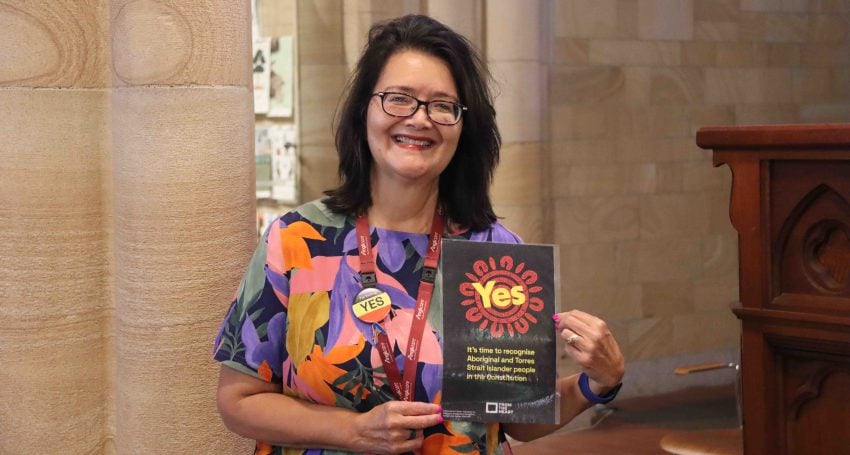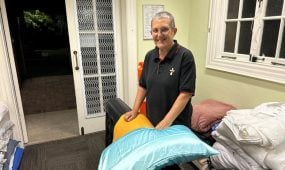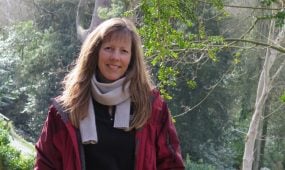Why I am voting “yes” in the referendum: Sue Cooke
Justice & Advocacy
“In order to effectively close the health and life expectancy gap, Aboriginal peoples in rural and remote contexts need a culturally safe and reliable grassroots channel to communicate their unique needs. This is one of the reasons I will be voting ‘yes’ for the Voice to Parliament,” says Anglicare Southern Queensland CEO and registered nurse Sue Cooke

Story Timeline
Why I am voting “yes” in the referendum
- Why I support constitutional recognition through an Aboriginal and Torres Strait Islander Voice to Parliament: Aunty Dr Rose Elu
- Why I am voting “yes” in the referendum: The Ven. Geoff Hoyte
- Why I am voting “yes” in the referendum: Phyllis Marsh
- Why I am voting “yes” in the referendum: Bishop Daniel Abot
- Why I am voting “yes” in the referendum: Adrian Malone
- Why I am voting “yes” in the referendum: The Rev’d Cameron Freese
- Why I am voting “yes” in the referendum: The Rev’d Rick Gummow
- Why I am voting “yes” in the referendum: Uncle Milton Walit
- Why I am voting “yes” in the referendum: Marilyn Wright
- Why I am voting “yes” in the referendum: Barry Kuskopf
- Why I am voting “yes” in the referendum: Aiden Wu
- Why I am voting “yes” in the referendum: Reg Dean
- Why I am voting “yes” in the referendum: Jill Rylatt
Throughout more than 30 years working as a registered nurse, I have had several opportunities to visit rural and remote communities and health services. So I have observed firsthand the significant disparity between the health and life expectancy of Aboriginal and Torres Strat Islander peoples and non-Indigenous peoples. Those who live in rural areas generally lack equal access to healthcare facilities and services compared to those who live in metropolitan areas. However, studies show that the life expectancy gap between non-Indigenous and Indigenous populations is widening.
Advertisement
In my early nursing years, this stark reality prompted me to seek to understand the broader issues for Aboriginal and Torres Strait Islander peoples in accessing health services. I subsequently developed an awareness of the cultural aspects that play a huge role in Indigenous healthcare. For example, I heard in one yarning session with several elders in Weipa (Alngith country) that many Indigenous peoples, especially elders in remote locations, regard hospitals as places to be avoided when unwell – for them, hospitals are where you go to die.
It was also obvious through their stories that many non-Indigenous healthcare practitioners lack vital cross-cultural sensitivity. For example, they often don’t take the time to build rapport with patients before asking intimate, albeit essential, questions. They also ask questions in ways that are considered inappropriate in a remote Aboriginal context. This has a huge impact on service delivery outcomes.
As a health professional, I have learned that simply understanding is insufficient. A deeper level of interaction and thoughtful practice that ensures culturally safe services, as defined by those who receive the services, is required. To effectively close the health and life expectancy gap, Aboriginal peoples in rural and remote contexts require a culturally safe and reliable grassroots channel to communicate their unique needs. This is one of the reasons I will be voting “yes” for the Voice to Parliament in this year’s referendum.
Advertisement
Editor’s note: The Anglican Church Southern Queensland supports constitutional recognition through an Aboriginal and Torres Strait Islander Voice to Parliament. For campaign resources and more information, please visit the YES23 website.
Editor’s note 15/03/2023: The ACSQ supports the Anglican Board of Mission’s 2017 call for “a Constitutionally Entrenched First Nations Voice”. The ACSQ also supports the Anglican Church of Australia’s Joint Affirmation of Faith and Justice with First Nations Peoples (carried by affirmation at General Synod, Oct 2007), and seeks practical ways to do so, including our association with Reconciliation Australia and the prescribed process of Reconciliation Action Plans.
Editor’s note: 21/07/2023: This anglican focus feature, written by The Ven. Geoff Hoyte, The Rev’d Michael Stalley and The Rev’d Rick Gummow, provides a timeline showing how the ACSQ came to its position on recognising Aboriginal and Torres Strait Islander peoples in the Constitution through a Voice to Parliament.





